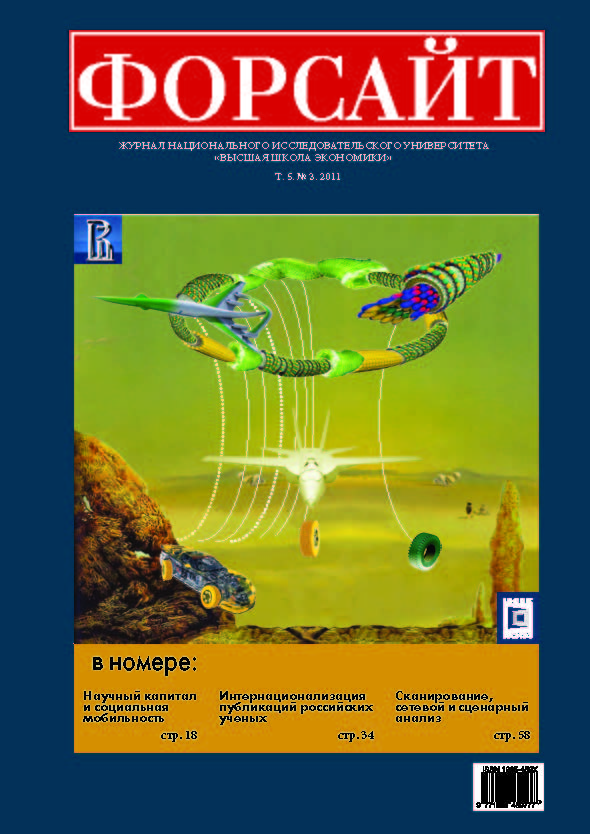Abstract
Science citation indices are increasingly referred to for assessing research performance and the efficiency of S&T policy. However, alongside evident advantages, are two serious shortcomings of citation indices: their focus on predominantly English-language publications that match specific criteria and the significantly large share of engineering disciplines and smaller share of humanities citations. In addition, the division of science communication markets into international and domestic introduces difficulties when comparing the publishing performance of scholars from different countries and complicates the interpretation of these data. As a result, indicators of publishing performance intrinsically do not reflect the state-of-the-art of national science — rather they demonstrate its internationally “visible” segment and the rate of internationalization for selected disciplines.
The paper reveals reasons for these misalignments. The author presents a historical retrospective of the internationalization of science leading to a common language of scientific communication (English) and dominance by Anglo-American academic publishers.
The paper looks specifically at Russia, with its predominantly locally oriented market for research publications. Russian science remains poorly integrated into international science. The paper examines Russia’s state and dynamics in contributing to international publications in this context: that of the global scientific communication system.
It is noted that using bibliometric tools alone are not enough to reveal the full picture. Russian practices in publications and citations, features of its national system of scientific communications, and mechanisms for gaining reputation should be used in analyzing Russia’s contributions vis-à-vis other countries.
References
Adams J., King C. (2010) The New Geography of Science: Research and Collaboration in Russia. Thompson Reuters.
Buela-Casal G., Perakakis P., Taylor М., Checa P. (2006) Measuring Internationality: Reflections and Perspectives on Academic Journals//Scientometrics. № 67. P. 45-65.
Charle C., Schriewer J., Wagner P. (2004) Transnational Intellectual Networks: Forms of Academic Knowledge and the Search for Cultural Identities. Campus Verlag.
Garfield E. (1976) Is French science too provincial?//La Recherche. Vol. 7. № 70. P. 757-760.
Gingras Y. (2002) Les formes spйcifiques de l'internationalite du champ scientifique//Actes de la recherche en sciences sociales. № 141-142. P. 31.
Glanzel W. (2001) National Characteristics in International Scientific Co-authorship//Scientometrics. Vol. 51. № 1. P. 69-115.
Glaser J., Laudel G. (2007) The Social Construction of Bibliometric Evaluations//Whitley R., Glaser J. (eds.) The Changing Governance of the Sciences. Dordrecht: Springer Netherlands. P. 101-123.
Goldfinch S., Dale T., De Rouen J.K. (2003) Science from the Periphery: Collaboration, Networks and Periphery Effects in the Citation of New Zealand Crown Research Institutes Articles, 1995-2000//Scientometrics. Vol. 57. № 3. P. 321-337.
Guan J., Ma N. (2004) A comparative study of research performance in computer science//Scientometrics. Vol. 61. № 3. P. 339-359.
Heilbron J. (2008) Qu'est-ce qu'une tradition nationale en sciences sociales?//Revue d'Histoire des Sciences Humaines. № 18. P. 3-16.
Pislyakov V. (2010) International coauthorship of Russian scientists: Papers and their citedness. Working paper WP6/2010/01. Moscow: HSE.
Pislyakov V., Dyachenko E. (2009) Citation expectations: are they realized? Study of the Matthew index for Russian papers published abroad//Scientometrics. № 83. P. 739-749.
Royle J., Coles L., Williiams D., Evans P. (2007) Publishing in international journals: An examination of trends in Chinese co-authorship//Scientometrics. Vol. 71. № 1. P. 59-86.
Suarez-Balseiro C., Garcнa-Zorita C., Sanz-Casado E. (2009) Multi-authorship and its impact on the visibility of research from Puerto Rico//Information Processing and Management. № 45. P. 469-476.
Wang S., Wang H., Weldon P.R. (2007) Bibliometric analysis of English-language academic journals of China and their internationalization//Scientometrics. № 73. P. 331-343.
Wilson C.S., Markusova V.A. (2004) Changes in the scientific output of Russia from 1980 to 2000, as reflected in the Science Citation Index, in relation to national politico-economic changes//Scientometrics. Vol. 59. № 3. P. 345-389.
Zitt M., Bassecoulard E. (2005) Internationalisation in Science in the Prism of Bibliometric Indicators Journals, Collaboration, and Geographic Distribution//Handbook of Quantitative Science and Technology Research. P. 407-436.
Zitt M., Perrot F., Barre R. (1998) The transition from national to transnational model and related measures of countries' performance//Journal of the American Society for Information Science and Technology. № 49. P. 30-42.
Гохберг Л.М., Китова Г.А., Кузнецова Т.Е., Шувалова О.Р. (2010) Российские ученые: штрихи к социологическому портрету. М.: ГУ-ВШЭ.
Российский инновационный индекс (2011). Под ред. Л.М. Гохберга. М.: НИУ ВШЭ.
Савельева И.М., Полетаев А.В. (2009) Публикации российских авторов в зарубежных журналах по общественным и гуманитарным дисциплинам в 1993-2008 гг.: количественные показатели и качественные характеристики. Препринт WP6/2009/02. М.: ГУ-ВШЭ.
Сивак Е.В., Юдкевич М.М. (2008) «Закрытая» академическая среда и локальные академические конвенции//Форсайт. T. 2. № 4. С. 32-41.
Соколов М.М. (2009) Национальные и международные репутации российских социологов: наукометрический анализ//Социологические исследования. № 1. C. 144-152.

This work is licensed under a Creative Commons Attribution 4.0 International License.

